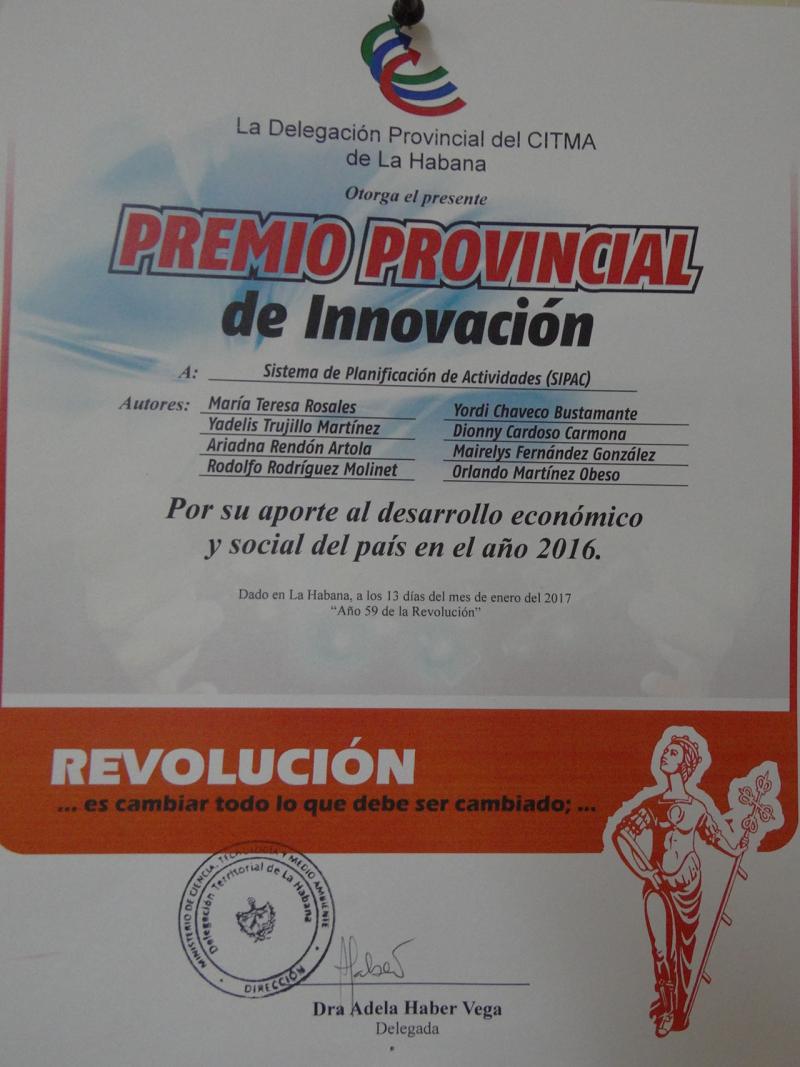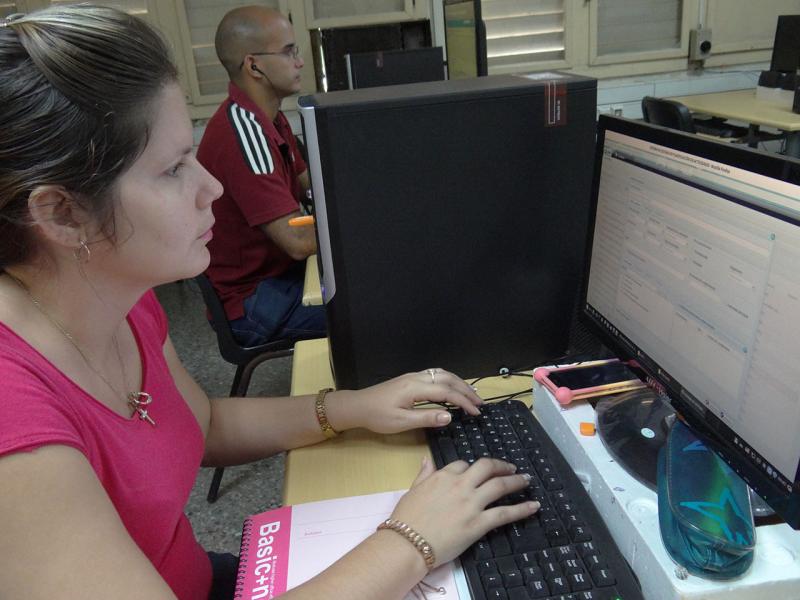Ing. Mairelys Fernández González, head of the SIPAC project at the UCI. Photo: Alberto Medina Cruz
SIPAC, a Novel Solution for the Planning of Activities
The System for Activities Planning (known as SIPAC), belonging to the Department of Management Applications, of the Entities Management Center (CEIGE) led by Eng. Eric Mario Gómez Pérez, is developed at the University of Informatics Sciences (UCI).
SIPAC began to be developed years before, but CEIGE assumed it since 2011. The system, which has been certified by the Activities Planning Group of the Secretariat of the Council of Ministers, is deployed in the provinces of Mayabeque, Artemisa and Pinar del Río , as well as in all the organisms of the Central State Administration.
As part of the system, version 2.1 has also reached the provinces of Santiago de Cuba, Granma, Holguín, Camagüey, and recently to Santi Spíritus and Cienfuegos.
For its valuable contribution to the computerization of the Cuban society, the results of the system were published by a journal recognized by the Ministry of Higher Education of the Republic of Cuba and indexed in Scielo. It has also received several UCI Rector's Prizes: in 2014 and 2015 to the most outstanding Project Leader; In 2015, a greater contribution to social development and greater contribution to national computerization. In 2016, It won the CITMA Provincial Award.
Ing. Mairelys Fernández González, project leader, agreed to satisfy our questions.
- What is the mission of SIPAC?
- Based on Instruction No.1 of the President of the Councils of State and Ministers, which governs the planning process of entities in a single tool, as the name implies, SIPAC computerizes and homogenizes the process of goal planning and activities that are carried out throughout the country.
"The System is currently in version 2.1, already certified and we have the 2.4, still being tested in the UCI. Once it is released, an updated it will be issued to the agencies where it has been installed.
"The above tools did not include all the activity planning processes. Now they are united in a single execution and control of the plans, processes of evaluation and punctuation, as well as of approval-conciliation.
"It has been installed in the agencies of the Central State Administration and in provincial and national entities of the People's Power such as the Prosecutor's Office, the Comptroller's Office and Customs."
- What acceptance has SIPAC had?
- The system has been very well accepted by customers, taking into account that at first the whole planning process was done manually, ie with an Excel. The punctuation process was very tiresome, and the information exchange process was also complicated (approval and circulation of official documents), as it was done by mail. Today the system establishes permissions to compartmentalize reading and writing information.
"This gives the measure that there is greater control, more identification of the tasks that each member has to execute. Therefore, there is greater respect for the plan and users feel identified with the system.
"I must emphasize that we have a serious customer who supports us at all times and follows us in the process, which is fundamental for success."
- How have they resolved the change requests?
- We have made many improvements from the requests for changes, which have been processed by the Council of Ministers. As they can be updated in the System are incorporated, which has achieved a degree of maturity in the product. Depending on what is being deployed, we are enriching what is delivered to the end customer.
- Why did they win the CITMA 2016 Provincial Award?
- This award is given precisely because it is a novel solution that includes all the processes related in Instruction No.1, that scientifically had not been investigated, nor linked all the processes in a single computer solution, which at the same time was certified with a high impact on the computerization of society, which is what we aspire to.
- How many people contribute to the success of SIPAC?
- We are a small development team, although there are a considerable number of people that are in development, of other centers and faculties of our University.
"With the contribution of others, we have enriched ourselves, carrying out development, support and certification tasks of the System, which is becoming more complex with deployments.
"We also have the support of the Support Center, which although they have the task of supporting the System, offer enough follow-up and increasingly show more concern for the customer.
"Having such a large collaboration is quite healthy for SIPAC.
"The other thing that should be highlighted above all else is the sense of belonging that the members of the team have; That is, there is a respect for the work done by the colleagues who were before. They present the system as if they had. "
- Other satisfactions and dissatisfactions.
- From the beginning, they tried to keep all the conditions in the project. It was one of the first laboratories that were declared Model in the University.
"Being few in the team we had to train several people who are not part of the project.
"Other dissatisfactions are given by clients because sometimes activities are coordinated but are not given."
- What does SIPAC most like?
- Then enriching the product. We want to take a higher version in which we will update the technology and take a step forward in usability because from a business point of view the system is quite complete and what could be done is to improve its sociability. As for the deployment, we aspire to continue reaching all the entities and agencies of the country, as it is established to be done.
The results obtained by the project are in line with the specific needs of computerization of the planning process by objectives. Participation in national events, awards, endorsements, acknowledgments, and letters of acceptance issued by the Planning Group of the Secretariat of the Executive Committee of the Council of Ministers reflect the scientific level of the product and the publications obtained have also contributed to its achievements.
It is a complete strategic and operational planning system that adapts to the particularities of the country and is based on the principles of technological independence, implementing general functionalities of the processes associated with the planning of objectives and activities, saving the country large amount of money and of time by means of personalizations of a standard software of planning or development of some components, modules or systems that computerize these processes.




